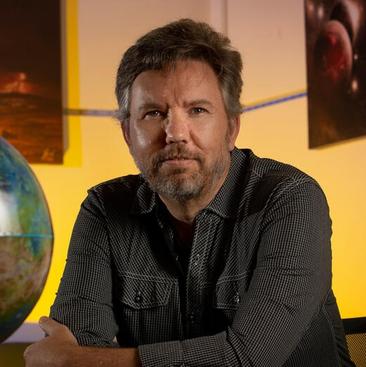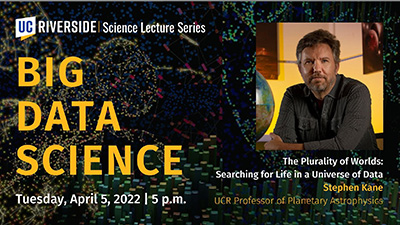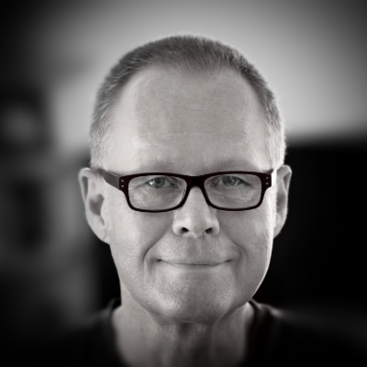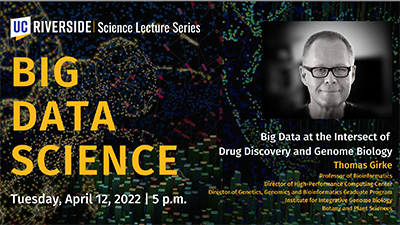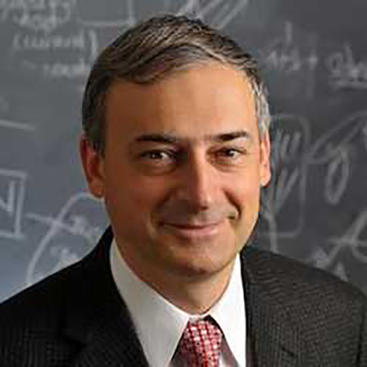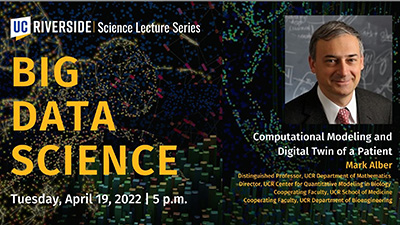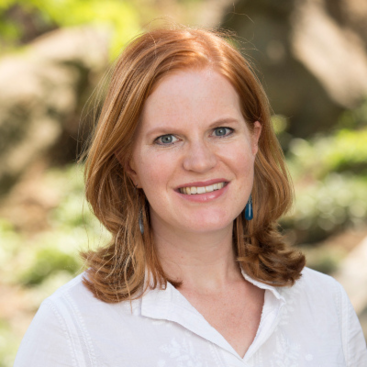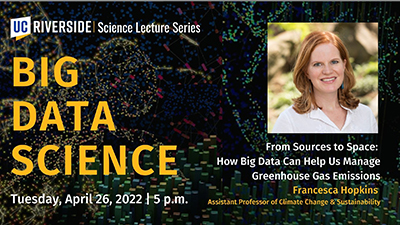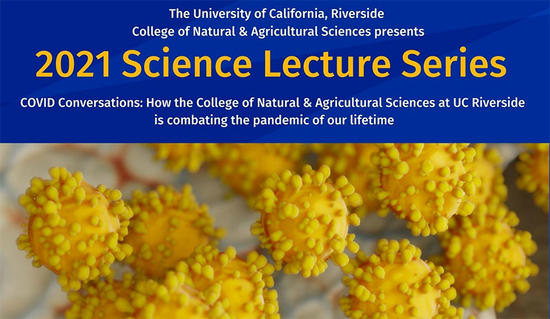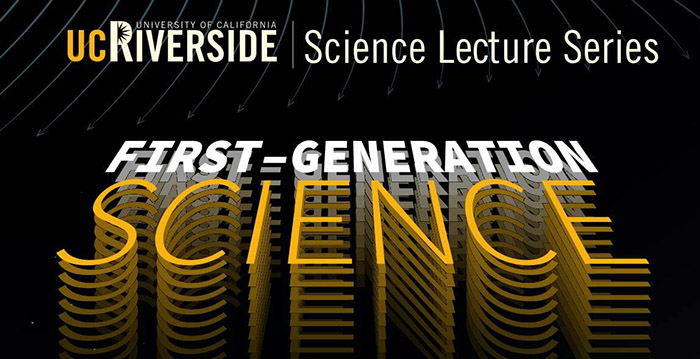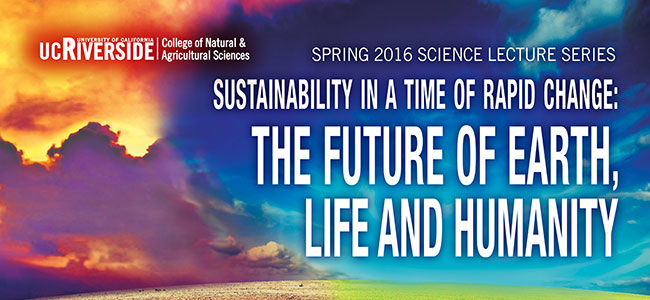The College of Natural and Agricultural Sciences proudly presents the annual Science Lecture Series at UC Riverside every spring quarter. Since its inception, CNAS scientists have shared their knowledge and research with students, alumni, faculty, staff, and community members. Each Science Lecture Series topic tackles some of the most pressing issues we face as a local, national, and global community.
The archive of Science Lecture Series presentations offers those that are curious about the sciences the ability to watch past lectures. We hope you enjoy watching our archive of past Science Lecture Series presentations. You can also find the video playlist of all the Science Lecture Series on YouTube.
-
Spring 2024 Lectures
The Escalating Climate Catastrophe
Tuesday, March 5, 2024
Robert J. Allen
Full Professor of Climatology
Department of Earth and Planetary Sciences
University of California, Riverside
Website: Allen Climate Dynamics Center AC/DCAbout Dr. Allen's Lecture
Since the dawn of the industrial age, our planet has warmed. Recent warming is widespread, rapid and intensifying. The ten hottest years on record have all occurred in the last decade. This past year (2023) was the hottest year by far at 1.34°C to 1.48°C warmer than the preindustrial average and among the warmest years in at least 100,000 years. At present rates of greenhouse gas emissions, it will only be a few years before the 2015 Paris Agreement’s 1.5°C goal is surpassed. In this talk, Dr. Allen discusses how and why our climate is changing and what we need to do to avert the climate catastrophe.About Dr. Allen
Dr. Allen’s educational background includes BS and MS degrees from Cornell University and a PhD in Atmosphere, Ocean and Climate Dynamics from Yale University. Dr. Allen is a climate scientist who uses state-of-the-art Earth system models, as well as a wide range of observations, to improve our understanding of the climate system. This includes natural climate variability and the processes involved, as well as how climate is changing, what is driving that change, and how to adapt to and mitigate such changes. Dr. Allen has published over 60 peer-reviewed climate research papers and he has received funding from national and international science funding agencies and private industry. He has participated in several international climate modeling efforts including the Aerosols and Chemistry Model Intercomparison Project, the Regional Aerosol Model Intercomparison Project and the Composition Air Quality Climate Interactions Initiative. He is also a contributing author to the 6th Assessment Report of the Intergovernmental Panel on Climate Change (IPCC), including chapters on Short-lived Climate Forcers and Water Cycle Changes. Dr. Allen currently serves as a research fellow at the Center for Advanced Studies at the Norwegian Academy of Science and Letters.
Gravitational Waves: Unraveling the Mysteries of our Universe
Tuesday, April 30, 2024
Barry C. Barish
Nobel Laureate in Physics (2017)
Distinguished Professor
Department Physics and Astronomy
University of California, Riverside
University of California, Riverside
900 University Avenue
Riverside, CA 92517Tuesday, April 30, 2024
Reception: 5-6 p.m.
Lecture: 6-7 p.m.
About Dr. Barish's Lecture
In 1916, Albert Einstein conjectured that gravitational waves exist. They were discovered a century later by LIGO, the Laser Interferometer Gravitational-wave Observatory. Now, less than a decade after discovery, gravitational waves are becoming a powerful new tool to explore and understand our universe. The discoveries, some puzzles and future possibilities will all be explored in this lecture.About Dr. Barish
Barry Barish, Distinguished Professor of Physics at UCR, was awarded the 2017 Nobel Prize in Physics "for decisive contributions to the LIGO detector and the observation of gravitational waves," along with American physicists Rainer Weiss and Kip S. Thorne. The existence of gravitational waves had been originally suggested by Albert Einstein is 1915. Barish and collaborators observed them coming from the collision of two black holes in the distant universe 100 years later, using their precision instrument called LIGO. Barish has received numerous other awards, including election to the National Academy of Sciences, the Royal Society in London, and has received many honorary degrees. This past fall, he was awarded the “National Medal of Science,” by President Biden, the highest award given to American Scientists.For more details, see Wikipedia
From Dirt to Data: Precision Insights for Sustainable Agricultural Systems
Tuesday, May 14, 2024
Elia Scudiero
Research Agronomist
Department of Environmental Sciences
University of California, Riverside
Website: Elia Scudiero's LabUCR Palm Desert Center
75080 Frank Sinatra Drive
Palm Desert, CA 92211Tuesday, May 14, 2024
Reception: 5-6 p.m.
Lecture: 6-7 p.m.About Dr. Scudiero's Lecture
Water scarcity and environmental degradation associated with intensive agriculture are threatening the environmental, economic, and social sustainability of food production in water-scarce farmlands in the US and globally. Although limited, water resources in California and many other US farmlands are often used non-parsimoniously and inefficiently. Therefore, improvements to current irrigation practices must be made to help sustain agricultural systems in the long term. Short-scale changes in soil properties often result in remarkable within-field crop yield variability. Geophysical measurements and GIS-based models to characterize trends and drivers of soil variability are needed for informed agricultural and natural resource management.This talk will feature research on the use of field measurements, near-ground and remote sensing, and spatiotemporal multi-scale (field to the regional scale) data analysis for i) mapping and monitoring soil properties across scales, ii) understanding soil-plant interactions, and iii) enable precision agronomic management.
About Dr. Scudiero
Elia Scudiero is an Associate Research Agronomist with the Environmental Sciences Department at the University of California, Riverside with a joint appointment at the USDA ARS US Salinity Laboratory, also in Riverside. Before moving to Riverside, Elia was awarded his Ph.D. in Crop Science from the University of Padua, Italy, in 2013. Elia’s Digital Agronomy Lab uses high-resolution near-ground and remote sensing to study agricultural systems across scales. This research supports sustainable site-specific agriculture management practices in California and globally.
-
Spring 2023 (No Lectures)
The Science Lecture Series did not take place during Spring 2023.
-
Spring 2022 Lectures
Tuesday, April 5, 2022 | 5 p.m.
The Plurality of Worlds: Searching for Life in a Universe of Data
Stephen Kane
Professor of Planetary AstrophysicsIn the space of only a few decades, the number of known planets orbiting other stars has risen from zero to over 5000. These discoveries have dramatically changed our understanding of planetary systems and further motivated the search for life in the universe. In this talk. Dr. Kane will describe the techniques that have allowed us to bring about this revolution in planetary science, the challenges in analyzing the massive amounts of data, and the future prospects in detecting life on another world.
About Stephen Kane
Stephen Kane is a Professor of Planetary Astrophysics at the University of California, Riverside who specializes in exoplanetary science. He grew up in outback Australia where his view of the night sky and fascination with solar system exploration motivated his eventual career path. He received his BS from Macquarie University in Sydney and his PhD from the University of Tasmania. His work covers a broad range of topics related to planetary astrophysics and he has discovered several hundred planets orbiting other stars. He is a leading expert on the topic of planetary habitability, the habitable zone of planetary systems, and the study of why Venus and Earth evolved so differently. He is a prominent scientific leader for several NASA missions designed to search for life in the universe. He has published hundreds of peer-reviewed scientific papers as well as several books on the topic of exoplanets and habitability. He is also a prolific advocate of interdisciplinarity science through the combination of biology, climate science, geophysics, planetary science, and stellar astrophysics.
stephenkane.net
planetlab.info
UCR Faculty: Stephen Kane
LinkedInWatch Video
Tuesday, April 12, 2022 | 5 p.m.
Big Data at the Intersect of Drug Discovery and Genome Biology
Thomas Girke
Professor of Bioinformatics
Director of High-Performance Computing Center (HPCC)
Director of Genetics, Genomics and Bioinformatics (GGB) Graduate Program
Institute for Integrative Genome Biology
Botany and Plant SciencesDr. Girke's research focuses on the development of computational methods for extracting knowledge from complex biological data by combining discovery driven research with algorithm and software development to address fundamental research questions in agricultural and biomedical sciences ranging from stress resistance in plants to healthy aging and longevity in humans. This involves very large data sets generated by a variety of high-throughput precision technologies, such as next generation sequencing (NGS), genome-wide profiling approaches and drug screens. These technologies have transformed biology into one of the most data intensive research disciplines of all time. Dr. Girke's presentation will illustrate how this New Age of Big Data Sciences has revolutionized the way we think about biological systems by allowing us to scale research experiments from deciphering the code and measuring the abundance of single biomolecules in the past to tens of thousand of them in the present. Moreover, this new era allows us to monitor with high precision how these factors vary across thousands of cell types, individuals in populations, or soon a large proportion of all living and many extinct species of our planet. In this overview, he will highlight how the analysis methods and software environments my group has developed, help to analyze these big data sets to gain novel insights into biological processes.
About Thomas Girke
Thomas Girke is a Professor of Bioinformatics at the University California, Riverside. He received his BA, MS and Ph.D. degrees from University Hamburg in Germany, followed by post-doctoral training at Michigan State University. Subsequently, he worked for several years in industry where he directed computational research projects in agricultural high-throughput screening projects for Dow AgroSciences and the Dow Chemical Company. After rejoining academia, Dr. Girke has developed an innovative computational biology and drug discovery research program at UCR that is funded by large grants from a variety of national funding agencies including NSF and NIH. His contributions to teaching and infrastructure development at UCR include directorships of the graduate program in Genetics, Genomics and Bioinformatics (GGB) as well as the High-Performance Computing Center (HPCC). Currently, the HPCC is enabling big data research for over 150 research groups from all schools and colleges at UCR.Girke Lab Research and Teaching Site
UCR Faculty: Thomas GirkeWatch Video
Tuesday, April 19, 2022 | 5 p.m.
Computational Modeling and Digital Twin of a Patient
Mark Alber
Distinguished Professor, UCR Department of Mathematics
Director, UCR Center for Quantitative Modeling in Biology
Cooperating Faculty, UCR School of Medicine
Cooperating Faculty, UCR Department of BioengineeringFueled by breakthrough technology developments, the biological, biomedical, and behavioral sciences are now collecting more data than ever before. There is a critical need for time- and cost-efficient strategies to analyze and interpret these data to advance human health. The recent rise of machine learning as a powerful technique to integrate multimodality, multifidelity data, and reveal correlations between intertwined phenomena presents a special opportunity in this regard.
This technique is incredibly successful in image recognition with immediate applications in diagnostics including electrophysiology, radiology, or pathology, where clinicians have access to massive amounts of annotated data. However, machine learning often performs poorly in prognosis, especially when dealing with sparse data. Multiscale computational modeling is a successful strategy to integrate multiscale, multiphysics data and uncover biological mechanisms that explain the emergence of function. However, multiscale modeling alone often fails to efficiently combine large datasets from different sources and different levels of resolution. In this lecture we will demonstrate that machine learning and multiscale modeling can naturally complement each other to create robust predictive models that can provide new insights into disease mechanisms, help identify new targets and patient specific treatment strategies, and inform decision making for the benefit of human health [1,2].
1. Mark Alber, Adrian Buganza Tepole, William R. Cannon, Suvranu De, Salvador Dura-Bernal, Krishna Garikipati, George Karniadakis, William W. Lytton, Paris Perdikaris, Linda Petzold & Ellen Kuhl, Integrating machine learning and multiscale modeling - perspectives, challenges, and opportunities in the biological biomedical, and behavioral sciences, npj Digital Medicine, 2:115 (2019).
2. Grace C. Y. Peng, Mark Alber, Adrian Buganza Tepole, William R. Cannon, Suvranu De, Salvador Dura-Bernal, Krishna Garikipati, George Karniadakis, William W. Lytton, Paris Perdikaris, Linda Petzold & Ellen Kuhl [2020], Multiscale Modeling Meets Machine Learning: What Can We Learn? Archives of Computational Methods in Engineering 28, 1017–1037 (2021).
About Mark Alber
Professor Mark Alber earned his Ph.D. in mathematics at the University of Pennsylvania under the direction of J. E. Marsden (UC Berkeley and Caltech). He held several positions at the University of Notre Dame including most recently Vincent J. Duncan Family Chair in Applied Mathematics. He is currently Distinguished Professor in the Department of Mathematics and Director of the Center for Quantitative Modeling in Biology, UC Riverside. Dr. Alber was elected a Fellow of the American Association for the Advancement of Science (AAAS) in 2011 and was appointed 2019 Honorary Kloosterman Professor at the Mathematical Institute, Leiden University, The Netherlands. He is currently a deputy editor of PLoS Computational Biology and member of editorial boards of Bulletin of Mathematical Biology and Biophysical Journal. His research interests include mathematical and computational multiscale modeling of blood clot formation, plants development and growth and epithelial tissue growth.
UCR Faculty: Mark AlberWatch Video
Tuesday, April 26, 2022 | 5 p.m.
From Sources to Space: How Big Data Can Help Us Manage Greenhouse Gas Emissions
Francesca Hopkins
Assistant Professor of Climate Change & SustainabilityGreenhouse gases emitted by humans present the biggest uncertainty in how much global warming the world will face over this century. While the political will to reduce emissions is beginning to be realized through laws to reduce emissions in California and new global agreements such as the 2021 Global Methane Emissions pledge, new science and technology approaches are needed to verify the success of these policies. In this talk, Dr. Hopkins will describe new observations of the most important greenhouse gases, carbon dioxide (CO2) and methane, from platforms ranging from mobile observatories to tower networks to plant samples to satellites. Along with new data systems to interpret these results and partnerships with stakeholders, these observations can help us reach our climate policy goals and ensure equity in the enactment of greenhouse gas mitigation strategies.
About Francesca Hopkins
Dr. Francesca Hopkins is an Assistant Professor of Climate Change and Sustainability in the Department of Environmental Sciences at the University of California, Riverside. Dr. Hopkins is an environmental scientist studying the effects of human activities on the global carbon cycle, with particular interest in greenhouse gas emissions and carbon cycle feedbacks to climate change. Dr. Hopkins and her research group use a range of techniques to measure emissions of greenhouse gases and air pollutants across California, including from dairy farms, vehicles, and oil and gas sources. Dr. Hopkins is also passionate about communicating the science of climate change. She led the Inland Desert chapter of the Fourth California Climate Assessment, released in 2018.Originally from Sonoma County, California, Dr. Hopkins received Bachelor’s degrees in Environmental Science and Spanish at the University of California, Berkeley. She studied abroad at the Pontifical Catholic University in Santiago, Chile. Dr. Hopkins completed her Ph.D. in Earth System Science at the University of California, Irvine. During graduate school, she also researched at the Max Planck Institute for Biogeochemistry in Jena, Germany. After receiving her Ph.D., Dr. Hopkins was a NASA Postdoctoral Fellow at the Jet Propulsion Laboratory in Pasadena from 2014-2016. In 2016, Dr. Hopkins was recognized as one of UC Irvine’s Top 50 Graduate and Postdoctoral Scholar Alumni.
Dr. Hopkins is also a busy parent of a kindergartner and preschooler.
UCR Faculty: Francesca Hopkins
Greenhouse Gas Emissions LabWatch Video -
Spring 2021 Lectures
Responding to the pandemic: How UC Riverside scientists created a COVID-19 testing lab for students
Tuesday, April 6, 2021 at 5 p.m.
Shortly after UC Riverside closed to protect its community from the spread of COVID-19, the campus began discussions to create its own testing lab to help mitigate the effects of the pandemic. Led by UCR scientists Katherine Borkovich and Isgouhi Kaloshian, in collaboration with partners across the university, the campus coronavirus testing lab opened in August 2020 and began providing UCR with on-site testing and rapid turnaround of results. However, the experience of creating a clinical COVID-19 testing lab from scratch during a global pandemic came with great challenges and also unexpected rewards. Join us on April 6 at 5 p.m. to learn how Drs. Borkovich and Kaloshian tackled challenges and experienced rewards when they created the COVID-19 testing lab at UC Riverside.
Guest Speaker: Katherine Borkovich, Professor and Chair, Department of Microbiology & Plant Pathology
Guest Speaker: Isgouhi Kaloshian, Professor and Chair, Department of Nematology
Moderator: Timothy Paine, Divisional Dean Agricultural & Natural Resources, Distinguished Professor, Department of EntomologyCOVID vaccines and beyond
Tuesday, April 13, 2021 at 5 p.m.
Our health and safety, as well as our ability to return to our pre-pandemic lives are conversations that are taking place all across the world — and vaccines are at the center of those conversations. The Science Lecture Series presentation on Vaccines and Beyond will highlight the work of two leading UCR scientists with expertise in virology and the development of vaccines.
Dr. Juliet Morrison’s research on viruses will help us understand the immune system’s response to a SARS-CoV-2 infection and how immunity is generated; how COVID vaccines protect against SARS-CoV-2; and why COVID vaccines still offer protection against the new variants of concern.
The three major COVID vaccines that obtained emergency use authorization from the FDA are based on two vaccine platforms, mRNA and adenovirus. Dr. Rong Hai will share how the mRNA and adenovirus vaccines platforms were selected to fight SARS2 viruses and the composition of these vaccines. He will also introduce a vaccine project that his lab is currently working on to engineer a vaccine candidate with dual specificity: influenza and COVID.
Be sure to tune into the Science Lecture Series on Vaccines and Beyond on Tuesday, April 13, 2021 at 5 p.m.
Guest Speaker: Rong Hai, Assistant Professor of Virology, Department of Microbiology & Plant Pathology
Guest Speaker: Juliet Morrison, Assistant Professor, Department of Microbiology & Plant Pathology
Moderator: Frances Sladek, Divisional Dean Life Sciences, Professor of Cell Biology, and ToxicologistUnderstanding coronavirus assembly: A crucial step towards destroying the enemy
Tuesday, April 20, 2021 at 5 p.m.
The ancient saying “know thy enemy” is just as true today as the world faces the deadly novel coronavirus. To understand how COVID-19 assembles itself into a viable virus, experts at the University of California, Riverside will share how their research, experiments and computer simulations, which has never before been performed on the coronavirus, will help propel the development of drug therapies that slow or destroy the virus.
Guest Speaker: Thomas Edward Kuhlman, Assistant Professor, Department of Physics and Astronomy
Guest Speaker: Roya Zandi, Professor, Department of Physics and Astronomy
Moderator: Umar Mohideen, Distinguished Professor, Department of Physics and Astronomy -
Spring 2019 Lectures
April 3: "Gravitational Waves: From Einstein to a New Science"
Barry C. Barish, Nobel Laureate and Distinguished Professor of Physics; UC Riverside College of Natural & Agricultural Sciences
watch VideoApril 10: "Between Battles: From Civil War to Combating Plant Disease"
Isgouhi Kaloshian, Professor of Nematology and Chair, Department of Nematology; UC Riverside College of Natural & Agricultural Sciences
April 17: "It’s About I: Invention, Innovation, and Inspiration"
Kathryn Uhrich, Professor of Chemistry and Dean; UC Riverside College of Natural & Agricultural Sciences
April 24: "Metathesis: A Change-Your-Partner Dance of Carbon-Carbon Bonds"
Richard Schrock, Nobel Laureate, UCR Alumnus, and Distinguished Professor, George K. Helmkamp Founder’s Chair of Chemistry; UC Riverside College of Natural & Agricultural Sciences
-
Spring 2018 Lectures
April 5: "The Hope and Threat of Human Gene Editing"
Martin Garcia-Castro, Associate Professor of Biomedical Sciences; UC Riverside School of Medicine
watch VideoApril 12: "Feeding the World: From Mendel to CISPR"
Carolyn Rasmussen, Assistant Professor of Plant Cell Biology; UC Riverside College of Natural & Agricultural Sciences
watch VideoApril 19: "LEGO, Language, and the Life of Bacteria"
Ansel Hsiao, Assistant Professor of Plant Cell Biology; UC Riverside College of Natural & Agricultural Sciences
Watch VideoMay 10: "Implications of Genetic Modifications in Humans and Other Organisms"
Carl Cranor, Distinguished Professor in Philosophy; UC Riverside College of Natural & Agricultural Sciences
Watch Video -
Spring 2017 Lectures
December 8: "Our Cosmic Origins: Stars, Galaxies, and the Stuff of Life"
Bahram Mobasher, Professor of Physics & Astronomy, Associate Director of Alternative Earths Astrobiology Center - UC Riverside
Watch VideoJanuary 12: "Alternative Earths: How Earth's Past Guides NASA's Search for Life"
Tim Lyons, Distinguished Professor of Biogeochemistry, Director of Alternative Earth's Astrobiology Center- UC Riverside
Watch VideoFebruary 1: "Ocean Worlds: Missions to Icy Moons and Dwarf Planets"
Kevin Hand, Deputy Project Scientist, Solar System Exploration Directorate, NASA Jet Propulsion Laboratory
Watch VideoMarch 23: "Mars 2020 & Beyond: Will We Find Life on the Red Planet?"
Ken Williford, Deputy Project Scientist, Mars 2020 Mission and Director, Astrobiogeochemistry Laboratory, NASA Jet Propulsion Laboratory
Watch VideoApril 13: "Alien Planets: Are There Other Earths Lurking in Our Galaxy?"
Antigona Segura Peralta, Professor of Astrobiology, National Autonomous University of Mexico
Watch Video -
Spring 2016 Lectures
April 7: "Earth Under Fire: How and Why our Climate is Changing"
Robert Allen, Assistant Professor of Earth Sciences
Watch Video Lecture Slides Lecture PhotosApril 14: "Canaries in a Coal Mine: Why Pollinators are Sensitive to Global Change and How You Can Help Them"
S. Hollis Woodard, Assistant Professor of Entomology
Watch Video Lecture Slides Lecture PhotosApril 21: "Change is Only Constant: 10,000 Years of Climate Variability in California and What it Means for Our Water Supply"
James Sickman, Professor of Hydrology and Chair, Department of Environmental Sciences
Watch Video Lecture Slides Lecture PhotosApril 28: "Catching Rays: Solar Energy for Today and Tomorrow"
Christopher Bardeen, Professor of Chemistry
Watch Video Lecture Slides Lecture Photos -
Spring 2015 Lectures
April 9: Feeding Botswana: From Field to Lab to Vaccine
Larry Grill ('79 Ph.D. Plant Pathology), Dean of Research, and Director, Vaccine Research Center, Keck Graduate Institute, Claremont, CA
Watch Video Lecture SlidesApril 23: Food Security for Africa: The Cowpea Story from Lab to Plate
Phil Roberts, UCR Professor of Nematology; Timothy Close, UCR Professor of Genetics; and Jeff Ehlers, plant geneticist, and Program Officer, Bill and Melinda Gates Foundation
Watch Video Lecture Slides Sellyna Ehlers' Afro-Indian Blackeye Beans RecipeMay 7: Seeds of Change: UCR's Healthy and Sustainable Food Initiative
Cheryl Garner, Executive Director of UCR Dining, Conference and Catering Services; and Neal Malik, Registered Dietician, UCR Dining Services
Watch Video Lecture SlidesMay 21: What You Eat Is How You Feel: Nutrition and Its Impact on Immunity and Health
Ilhem Messaoudi Powers, Associate Professor of Biomedical Sciences, UCR School of Medicine
Watch Video Lecture Slides -
Winter and Spring 2014 Lectures
The 2014 series was held January 22 - May 7
January 22: HAIR: The History of Animals Using Isotope Records
Thure Cerling, University of Utah
Watch Video Lecture SlidesMarch 5: The Deep History of Life
Andrew Knoll, Harvard University
Watch Video Lecture SlidesApril 2: What's for Dinner? Molecular Signatures of Plants, Animals, and Water in Early Human Habitats
Kate Freeman, Pennsylvania State University
Watch VideoApril 9: How Fracking Impacts Our Water: The Pennsylvania Experience
Sue Brantley, Pennsylvania State University
Watch Video Lecture SlidesApril 23: Global Warming 36 Million Years Ago: What It Means for Us
Scott Wing, Smithsonian Institution
Watch Video Lecture SlidesMay 7: Beyond Seismology: Studying Earthquakes and Faults From Space
Gareth Funning, University of California, Riverside
Watch Video Lecture Slides -
Spring 2013 Lectures
THE SCIENCE OF DISEASE
The 2013 series was held April 18 - May 30 from 5:30 to 6:30 p.m., in the University of California, Riverside, Extension Center.
April 18: Drinking water: How safe is safe enough?
Marylynn V. Yates, Dean of the College and Professor of Environmental Microbiology
Introduced by Murrieta Valley Unified School District teacher Dean NielsenMay 2: Friends and enemies: Dynamic interactions of plants and insects
Linda Walling, Professor of Genetics, Department of Botany and Plant Sciences
Introduced by Riverside Unified School District teacher Derrick SergeantMay 16: Curing cancer: How do anticancer drugs work?
Yinsheng Wang, Professor of Chemistry
Introduced by Moreno Valley Unified School District teacher Aurora JohnsonMay 30: The promise of stem cells: Hope or hype?
Nicole zur Nieden, Assistant Professor of Cell Biology and Neuroscience
Introduced by Murrieta Unified School District teacher Jack Jones -
Spring 2012 Lectures
EARTH 101: WHAT YOU NEED TO KNOW ABOUT LIFE ON OUR PLANET
The 2012 series was held March 29 - May 10, 6:00-7:00 p.m., in the University of California, Riverside, Extension Center.
Earth 101: Too Many People
Rich Cardullo, Professor of Biology
Introduced by Riverside Unified School District teacher Jeremy StanderferEarth 101: What Hollywood Can Teach Us About Our Planet
Jodie, Holt, Professor of Plant Physiology
Introduced by Moreno Valley Unified School District teacher Aurora JohnsonEarth 101: What's Your Carbon Footprint?
Lou Santiago, Professor of Physiological Ecology
Introduced by Riverside Unified School District teacher John RobertsonEarth 101: Where Does Your Water Come From?
Dan Schlenk, Professor of Aquatic Toxicology
Introduced by Murrieta Unified School District teacher Dean NielsenUCTV
The videos appeared on UCTV, the University of California's television station, according to the following schedule:
- Earth 101: Too Many People? • Monday, September 3, 2012 • 2:00-3:00 p.m.
- Earth 101: What Hollywood Can Teach Us About Our Planet • Monday, September 10, 2012 • 2:00-3:00 p.m.
- Earth 101:What's Your Carbon Footprint? • Monday, September 17, 2012 • 2:00-3:00 p.m.
- Earth 101:Where Does Your Water Come From? • Monday, September 24, 2012 • 2:00-3:00 p.m.
-
Spring 2011 Lectures
The 2011 series was held April 14 - May 19
April 14: The Dynamic Genome: Unintelligent Design
Marylynn V. Yates, Dean of the College and Professor of Environmental Microbiology
Introduced by Murrieta Valley Unified School District teacher Dean Nielsen
Watch VideoApril 28: What's In Your Garden? Protecting California from Invasive Species
Mark Hoddle, Extension Specialist and Director of the Center for Invasive Species Research
Watch VideoMay 5: Designs from Nature: A New Spin on High-Performance Materials
Professor of Biology Cheryl Hayashi
Watch VideoMay 19: Size Matters: Nanotechnology & Other Wonders in Carbon Flatland
Associate Professor of Physics Jeanie Lau
Watch Video -
Spring 2010 Lectures
The Spring 2010 series was held April 8 - June 3
April 8: What Awaits Us in the Greenhouse World
Professor of Geology Martin Kennedy
April 22: Climate's Control of California Landscapes
Professor of Geography Richard Minnich
Watch VideoMay 6: In the Crosshairs: California's Environment
Professor of Plant Pathology Michael Allen
Watch VideoMay 20: Tipping the Scales? Pest Insects, Agriculture, & Health
Professor of Entomology Peter Atkinson
Watch VideoJune 3: The Food Challenge: Waterproof Rice & Other Solutions
Professor of Genetics Julia Bailey-Serres
Watch Video -
Spring 2009 Lectures
The Spring 2009 series was held April 2 - May 28
April 2: The Dance of the Genes: How Biological Evolution Works
Norman Ellstrand, Department of Botany and Plant Sciences
Watch VideoApril 16: Evolution and Medicine: Why Doctors Need Darwin
Marlene Zuk, Department of Biology
Watch VideoApril 30: The Evolution of Evolution: Darwin Then and Now
David Reznick, Department of Biology
Watch VideoMay 14: Life's Rocky Road: The History of Life on Earth
Nigel Hughes, Department of Earth Sciences
Watch VideoMay 28: Let There Be Light: The First Billion Years
Bahram Mobasher, Department of Physics and Astronomy
Watch Video -
Fall 2009 Lectures
The Fall 2009 series was held October 15 - November 12
October 15: The Battle Within: Our Evolutionary Struggle with Cancer
Leonard Nunney, Department of Biology
Watch VideoOctober 29: Born to Run: Evolution of Hyperactivity in Mice
Theodore Garland, Department of Biology
Watch VideoNovember 12: The Silent Majority: How Symbiotic Bacteria Evolve to Help and Hurt
Joel Sachs, Department of Biology
Watch Video

